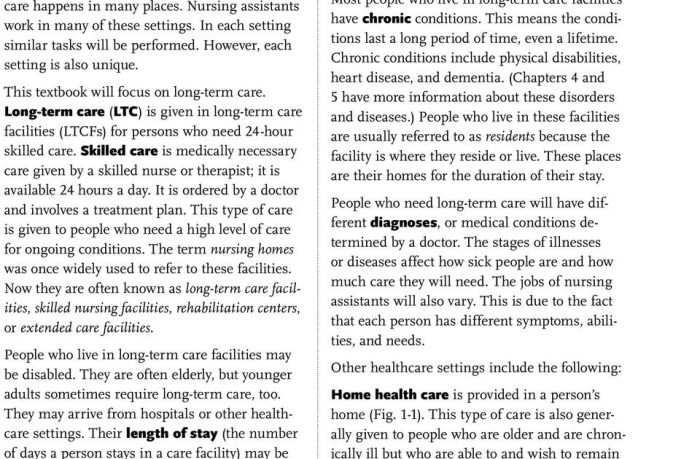Hartman’s nursing assistant care workbook answers chapter 8 – Hartman’s Nursing Assistant Care Workbook Answers: Chapter 8 Unveiled: Delving into the intricacies of elderly care, this chapter provides a comprehensive guide to the essential skills and techniques required for providing compassionate and effective assistance to senior individuals. With a focus on personalized care, dignity, and well-being, this chapter empowers nursing assistants with the knowledge and strategies to enhance the quality of life for the elderly population.
Overview of Chapter 8 in Hartman’s Nursing Assistant Care Workbook
Chapter 8 of Hartman’s Nursing Assistant Care Workbook covers the essential personal care skills required to assist elderly individuals. It emphasizes the importance of providing individualized care that respects their dignity and preferences while maintaining their well-being.
Key Concepts
- Personal care skills for the elderly
- Bathing and grooming techniques
- Dressing and undressing assistance
- Feeding and hydration support
- Mobility and exercise assistance
- Toileting and incontinence care
- Cognitive and emotional support
Main Objectives
- To provide a comprehensive understanding of personal care skills for the elderly
- To develop the necessary skills to assist elderly individuals with bathing, grooming, dressing, and other daily activities
- To learn about different methods of feeding and hydration support and how to provide them
- To understand the importance of mobility and exercise and how to assist elderly individuals with these activities
- To provide effective toileting and incontinence care to elderly individuals
- To provide cognitive and emotional support to elderly individuals
Personal Care Skills for the Elderly
Providing personal care to elderly individuals requires a compassionate and individualized approach. It involves assisting with activities of daily living (ADLs) such as bathing, grooming, dressing, and toileting. It is essential to respect the dignity and preferences of the elderly and to provide care that maintains their well-being and independence.
Importance of Individualized Care
- Recognizes the unique needs and preferences of each individual
- Promotes a sense of autonomy and self-worth
- Enhances the quality of life and well-being
Bathing and Grooming Techniques

Bathing and grooming are essential for maintaining hygiene and preventing skin irritation. Elderly individuals may require assistance with these activities due to physical limitations or cognitive impairments. It is important to use proper techniques to ensure their safety and comfort.
Bathing Techniques
- Bed baths: Used for individuals who are unable to stand or shower
- Showers: May be used for individuals who are able to stand and have adequate balance
Grooming Techniques
- Hair care: Includes shampooing, conditioning, and styling
- Nail care: Includes trimming, filing, and cleaning nails
- Skin care: Includes cleansing, moisturizing, and protecting the skin
Dressing and Undressing Assistance: Hartman’s Nursing Assistant Care Workbook Answers Chapter 8
Dressing and undressing can be challenging for elderly individuals with limited mobility or cognitive impairments. Providing assistance with these activities requires patience and understanding. It is important to maintain privacy and comfort while ensuring the individual is dressed appropriately.
Techniques for Adaptive Clothing and Devices
- Use adaptive clothing designed for easy dressing
- Utilize assistive devices such as dressing sticks and sock aids
Maintaining Privacy and Comfort
- Provide a private and comfortable environment
- Respect the individual’s modesty and dignity
Feeding and Hydration Support

Elderly individuals may require assistance with feeding and hydration due to physical, cognitive, or dental impairments. Providing appropriate support is essential to maintain their nutritional status and prevent dehydration.
Methods of Feeding and Hydration Support
- Oral feeding: Assisting with eating and drinking
- Tube feeding: Providing nutrition through a tube inserted into the stomach or small intestine
- Intravenous fluids: Administering fluids and nutrients directly into the bloodstream
Monitoring Nutritional Intake and Preventing Dehydration
- Monitor food and fluid intake
- Assess for signs of malnutrition and dehydration
Mobility and Exercise Assistance
Maintaining mobility and exercise is crucial for elderly individuals to prevent immobility and promote overall well-being. Providing assistance with transfers, ambulation, and range-of-motion exercises can help them stay active and independent.
Transfers
- Assisting with moving from one surface to another, such as from a bed to a wheelchair
- Using proper body mechanics to prevent injury
Ambulation, Hartman’s nursing assistant care workbook answers chapter 8
- Assisting with walking and moving around
- Using assistive devices such as canes or walkers
Range-of-Motion Exercises
- Assisting with exercises that maintain flexibility and range of motion
- Preventing muscle atrophy and contractures
Toileting and Incontinence Care
Toileting and incontinence care are essential aspects of personal care for elderly individuals. It is important to provide assistance with toileting, manage incontinence, and maintain cleanliness to prevent skin breakdown and infections.
Types of Incontinence
- Stress incontinence: Leakage of urine due to pressure on the bladder
- Urge incontinence: Leakage of urine due to an overactive bladder
- Overflow incontinence: Leakage of urine due to an inability to empty the bladder completely
Care Techniques for Incontinence
- Using absorbent pads or briefs
- Performing perineal care to clean the genital area
- Promoting fluid intake to prevent dehydration
Cognitive and Emotional Support

Cognitive and emotional support are essential for elderly individuals to maintain their well-being. Providing reassurance, managing behavioral challenges, and promoting social interaction can help them cope with the challenges of aging.
Communicating Effectively
- Using clear and concise language
- Maintaining eye contact and a respectful tone
- Allowing ample time for the individual to respond
Providing Reassurance
- Listening attentively to concerns and fears
- Providing emotional support and validation
- Reminding the individual of their strengths and capabilities
Managing Behavioral Challenges
- Understanding the underlying causes of behavioral challenges
- Using positive reinforcement and redirection techniques
- Seeking professional help if necessary
Detailed FAQs
What are the key objectives of Chapter 8 in Hartman’s Nursing Assistant Care Workbook?
Chapter 8 aims to provide nursing assistants with a thorough understanding of the specific personal care skills required for assisting elderly individuals, emphasizing the importance of individualized care that respects their dignity and preferences.
How does Chapter 8 address the importance of hygiene and skin care for the elderly?
Chapter 8 highlights the crucial role of maintaining hygiene to prevent skin irritation and infections. It provides detailed instructions on proper bathing and grooming techniques, including bed baths, showers, and hair care, tailored to the needs of elderly individuals.
What techniques are discussed in Chapter 8 for assisting elderly individuals with dressing and undressing?
Chapter 8 offers practical guidance on assisting elderly individuals with dressing and undressing, including techniques for handling adaptive clothing and devices. It emphasizes the importance of maintaining privacy and comfort throughout the process.